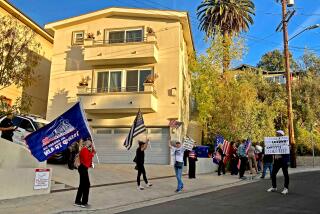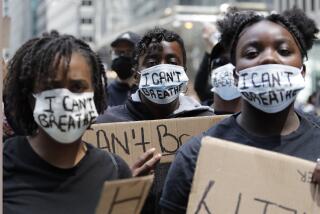Anti-Milosevic Protesters Confront Serb Police, but Avoid Major Incident
- Share via
BELGRADE, Yugoslavia — Thousands of pro-democracy marchers came face to face with Serbia’s dreaded Interior Ministry police Wednesday night, but backed down in time to avoid serious violence.
An estimated 25,000 protesters, led by Democratic Party President Zoran Djindjic, were dispersed by hundreds of club-wielding riot police in central Belgrade as the crowd headed toward Yugoslav President Slobodan Milosevic’s home. The police were backed up by five vehicles mounted with water cannons.
“Go back to Kosovo!” angry demonstrators shouted at the police as protest organizers linked arms to keep the surging crowd back. “Murderers! Murderers!” they taunted.
Serbia’s Interior Ministry police are suspected of committing some of the worst atrocities against ethnic Albanians in more than a year of civil war in Kosovo, a southern province of Serbia, the main Yugoslav republic.
About 45 minutes after the protest stopped just a few yards from the Yugoslav army’s headquarters, police moved against the crowd, hitting demonstrators who didn’t run fast enough.
Djindjic’s bodyguards scuffled briefly with police on a side street after officers tried to club the Democratic Party leader, who said in an interview minutes later that the marchers never intended to reach Milosevic’s house.
“It was a test,” Djindjic said. “It was the first confrontation in this process, and we will see the consequences tomorrow and after tomorrow.”
Djindjic is struggling to spark a mass movement strong enough to topple the Yugoslav leader. But he said he is being careful not to provoke the violence that many Serbs fear Milosevic wants as an excuse to come down hard on the pro-democracy movement.
“There are many children and old people among the demonstrators, and we must be very careful,” Djindjic said.
Vuk Draskovic, Djindjic’s main rival, didn’t join in Wednesday night’s march and insists that street protests won’t work because Milosevic’s security forces are too strong.
Milosevic and his lieutenants are sending signals that he is ready to crack down if the protests present a serious threat to his rule.
Serbia’s government this week launched what the opposition called a “psychological war” by declaring that police will visit almost every home in Serbia to check each person’s identity documents.
Yugoslav law requires all citizens and foreign visitors to register their residence with the police, and to re-register within eight days of moving to a new address.
The door-to-door document checks will help “policemen develop personal contacts that will result in an information exchange important for society,” Serbian Deputy Interior Minister Obrad Stevanovic said last week. “It is our wish that every citizen gets to know his sector cop.”
The opposition Democratic Party called the police campaign “not only a violation of the law and of the constitution, but also an invitation to open terror.”
“There is no sense in this action except to spread fear,” Slobodan Vuksanovic, vice president of the Democratic Party, said in an interview. “. . . It’s psychological war, a propaganda war against citizens, supporters of the opposition, against political parties.”
The first known target of the document checks was the owner of the sound system used at nightly opposition rallies in central Belgrade’s Republic Square.
Police arrested the owner, Nikola Djurickovic, shortly after 11 p.m. Sunday and ordered him jailed for seven days because he did not register after moving from Montenegro, Serbia’s sister republic in Yugoslavia. He was also fined slightly more than $30 for disturbing the peace.
While Serbia’s Interior Ministry police made their rounds, Milosevic turned up the volume on his propaganda with a triumphant reopening of the Pancevo oil refinery, which the North Atlantic Treaty Organization bombed seven times during 78 days of airstrikes last spring.
Serbia’s state-run television devoted most of Wednesday night’s newscast to Milosevic’s speech at the refinery to show that the man indicted for war crimes in Kosovo was still firmly in control in Belgrade, the Serbian and Yugoslav capital.
Five minutes of ads before the news included one showing two Interior Ministry police officers calling at the apartment of an elderly woman, who invited them in for coffee on the living-room couch while they checked to see whether her family’s documents were in order.
Djindjic’s Democratic Party has advised people to ignore the police when they come knocking.
“If they come to my door, I won’t open it,” Vuksanovic said. “ . . . The police can’t do anything but try again.”
Since the residency laws weren’t strictly enforced until now, many people may find themselves in trouble with the law, if only because their addresses have changed since the last time they registered with the police, lawyers said.
But it will be especially difficult for Serbian refugees, including an estimated 187,000 from Kosovo whom Milosevic is trying to keep from resettling in Serbia proper.
“The state should allow them to register first and check on them later,” lawyer Aleksandar Todorovic said. “Instead, they are asking them to cancel their previous residency records, and who can go to Croatia or Kosovo safely to register there? These people will have a problem.”
Serbs have never seen such a broad security sweep, even during the worst years under Josip Broz Tito, Yugoslavia’s former Communist dictator, Vuksanovic said.
Tito’s state was so strong that he didn’t need to send police out knocking on almost everyone’s door, and Milosevic is proving the weakness of his regime by doing just that, Vuksanovic said.
More to Read
Sign up for Essential California
The most important California stories and recommendations in your inbox every morning.
You may occasionally receive promotional content from the Los Angeles Times.













